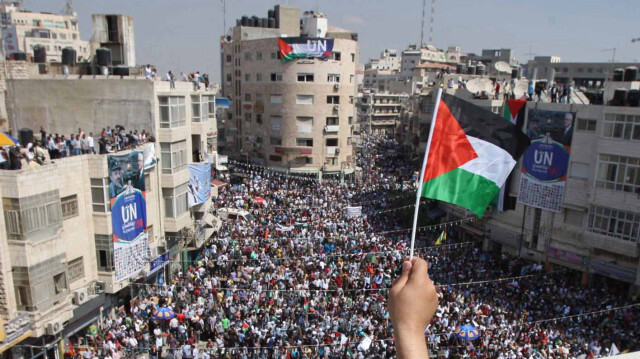
Nakba, or Catastrophe in Arabic, is marked by Palestinians on May 15 to remember expulsion from their homes, lands in 1948 after founding of Israel
Prominent groups and individuals across Europe on Wednesday marked the 76th anniversary of Nakba, or Catastrophe -- the expulsion of hundreds of thousands of Palestinians from their land in 1948 after the founding of Israel.
Jeremy Corbyn, the former leader of UK main opposition Labour Party, on X stressed that Nakba "did not end" and it is an "ongoing ethnic cleansing" campaign.
"Today marks the anniversary of the Nakba, when 750,000 Palestinians were expelled from their homes. The Nakba didn't end in 1948. It is an ongoing campaign of ethnic cleansing, violence and occupation," Corbyn said.
"Our solidarity lives on - we will never give up on the Palestinian people," he added.
Orfhlaith Begley, an Irish Sinn Fein politician at UK Parliament, also drew attention to the fact that Nakba is still "ongoing today."
"Ireland will always stand with Palestine," Begley said on X and urged: "End the occupation. Free Palestine."
The UN agency for Palestinian refugees (UNRWA), for its part, underscored to need to seek "a fair and definitive solution for Palestine refugees" as "now history (Nakba) repeats itself in Gaza."
British-Egyptian actor Khalid Abdalla also remembered the harrowing experience of Palestinians and said: "Today marks 76 years of an ongoing Nakba. Count the 14,000 sequins however you want. Each one a child killed in this war, or a marker of hundreds of thousands of families displaced in 1948, and the legacies that lead us to today in Gaza."
"We must be the generation that ends this, for everyone," Abdalla wrote on X.
Apsana Begum, member of the UK Parliament for the Labour Party, said: "Decades on, Gaza is being indiscriminately bombed and the displacement continues."
"Today and every day: we must call for a free and independent Palestine," Begum urged in a post on X.
Israel has waged a brutal offensive on the Gaza Strip in retaliation for an Oct. 7, 2023, Hamas attack, which killed 1,200 people.
More than 35,200 Palestinians have since been killed in Gaza, mostly women and children, and over 79,100 others injured, according to Palestinian health authorities.
Over seven months into the Israeli war, vast swathes of Gaza lay in ruins, pushing 85% of the enclave's population into internal displacement amid a crippling blockade of food, clean water, and medicine, according to the UN.
Israel stands accused of “genocide” at the International Court of Justice, which has ordered Tel Aviv to ensure its forces do not commit acts of genocide and take measures to guarantee that humanitarian assistance is provided to civilians in Gaza.

